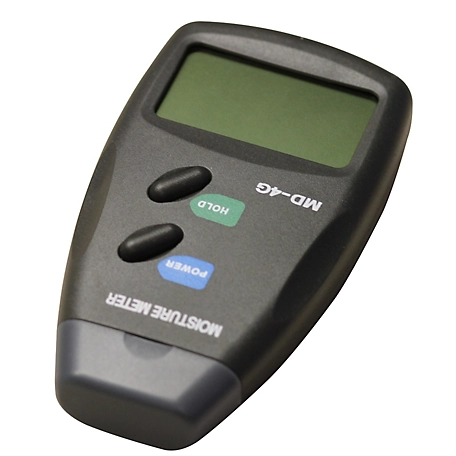The Scientific Research Behind Moisture Meters: Just How They Work and Why They're Essential
The Scientific Research Behind Moisture Meters: Just How They Work and Why They're Essential
Blog Article
The Ultimate Overview to Wetness Meters: A Comprehensive Introduction and Exactly How They Can Save You Cash
Dampness meters serve as crucial tools in spotting and checking moisture material in materials, aiding in protecting against expensive damages and ensuring the top quality of items. Recognizing the nuances of different types of dampness meters, their applications, and the potential cost-saving benefits they supply can be a game-changer for professionals and organizations alike.
Kinds of Moisture Meters
Various kinds of moisture meters are offered for different applications in various industries. One common kind is the pin-type moisture meter, which gauges the electric resistance between 2 pins put into a material. This type is ideal for wood, drywall, and various other structure materials. Pinless dampness meters, on the other hand, use electromagnetic sensing unit plates to check a bigger area without triggering damage to the material's surface. Moisture Meter. These meters are optimal for swiftly examining dampness degrees in large locations such as walls and floorings.

Additionally, there are additionally specialty dampness meters designed for certain products like soil, grain, or hay. These meters give exact wetness readings tailored to the special residential or commercial properties of the material being tested. Infrared moisture meters measure the thermal properties of a product to determine its moisture material non-invasively, making them valuable for applications where pin or pinless meters may not appropriate. Understanding the various sorts of dampness meters offered can help sectors choose the most ideal device for their particular dampness dimension needs.

Benefits of Utilizing Wetness Meters
Wetness meters supply indispensable benefits in precisely keeping track of and analyzing moisture degrees in diverse products and atmospheres (Moisture Meter). Among the key benefits of utilizing wetness meters is the prevention of prospective damage triggered by excess moisture. By detecting and attending to high dampness levels early, wetness meters assist to avoid mold growth, rot, and architectural damage in buildings, conserving both time and money on repairs. Additionally, moisture meters aid in guaranteeing the top quality of materials during building and construction or manufacturing processes. By properly measuring dampness content, these devices assist maintain the honesty of timber, drywall, concrete, and various other products, decreasing the threat of failures or problems.
Moreover, utilizing moisture meters can lead to boosted energy performance. In farming settings, moisture meters play an important role in enhancing plant returns by enabling farmers to keep an eye on soil moisture levels and make notified irrigation choices.
How to Choose the Right Wetness Meter
When picking a wetness meter, it's crucial to guarantee that the meter is appropriate for the specific product you will certainly be screening. Various products have differing electrical residential properties that can impact moisture analyses, so selecting a meter developed for your material is critical for precise results. By thoroughly evaluating these Full Article aspects, you can pick a wetness meter that meets your demands and provides exact moisture measurements for your projects.
Proper Techniques for Moisture Meter Use

Expense Savings With Dampness Meter Applications
How can the critical usage of dampness meters lead to significant cost savings throughout different markets? In the agriculture market, dampness meters help in establishing the optimum time for gathering plants, preventing over-drying or excess wetness that can affect the final product's high quality.
Likewise, in building and construction, moisture meters assist stop costly problems by detecting dampness levels in building materials, such as timber or concrete, which can result in architectural issues if not resolved quickly. By determining issue locations at an early stage, professionals can take corrective procedures to avoid considerable repairs or replacements, inevitably conserving money and time.
Moreover, in the food processing market, moisture meters are vital for checking item high quality and making sure conformity with safety policies. By precisely measuring wetness material in foodstuff, makers can avoid spoilage, maintain freshness, and minimize waste, leading to considerable cost financial savings. Overall, the calculated application of moisture meters is an important investment that can cause substantial cost decreases and boosted effectiveness across numerous sectors.
Conclusion
Finally, moisture meters are valuable devices for measuring and identifying wetness levels in numerous materials. By using the ideal moisture meter and complying with proper strategies, users can effectively stop costly damages brought on by excess dampness. Purchasing a high quality moisture meter can result in substantial expense savings in the lengthy run by identifying prospective problems at an early stage and enabling punctual removal. Eventually, wetness meters blog here are vital instruments for preserving the stability and long life of products and frameworks.
Moisture meters offer as vital devices in identifying and keeping an eye on moisture content in products, helping in stopping expensive problems and making certain the high quality of items. Infrared dampness meters determine the thermal buildings of a product to establish its moisture content non-invasively, making them beneficial for applications where pin or pinless meters may not be ideal.Wetness meters offer invaluable benefits in precisely assessing and keeping track of dampness degrees in diverse products and atmospheres. In farming settings, moisture meters play a critical function in optimizing crop yields by enabling farmers to keep track of dirt wetness degrees and make informed irrigation decisions.In verdict, moisture meters are useful tools for gauging and discovering moisture degrees in different products.
Report this page